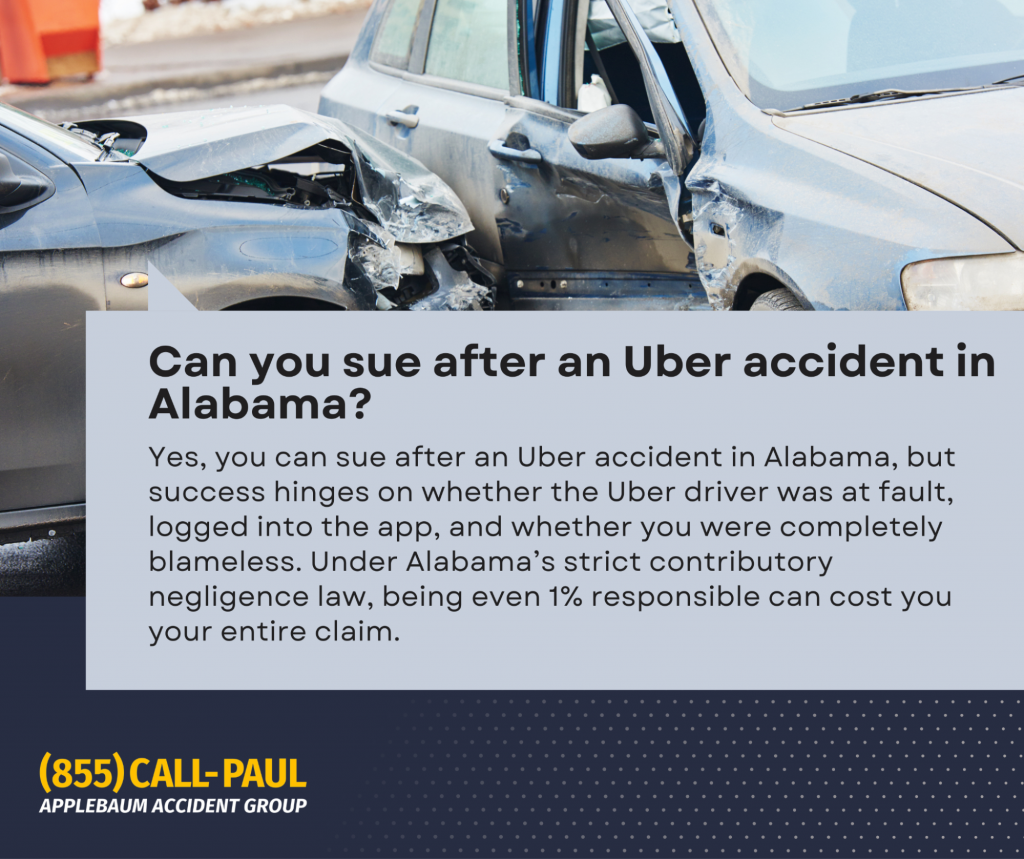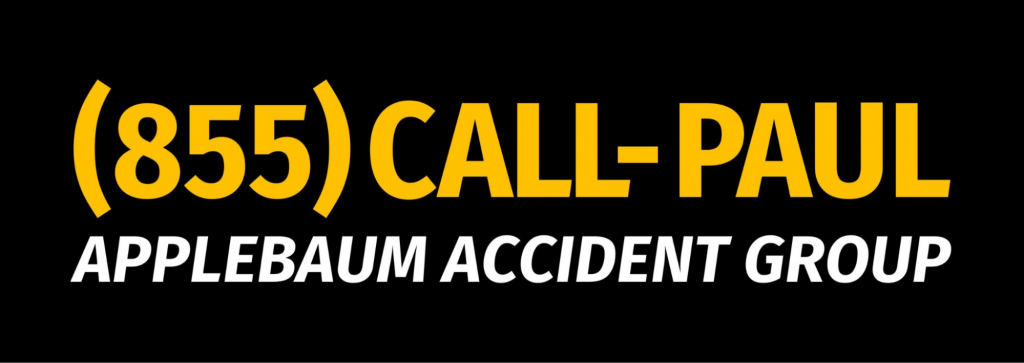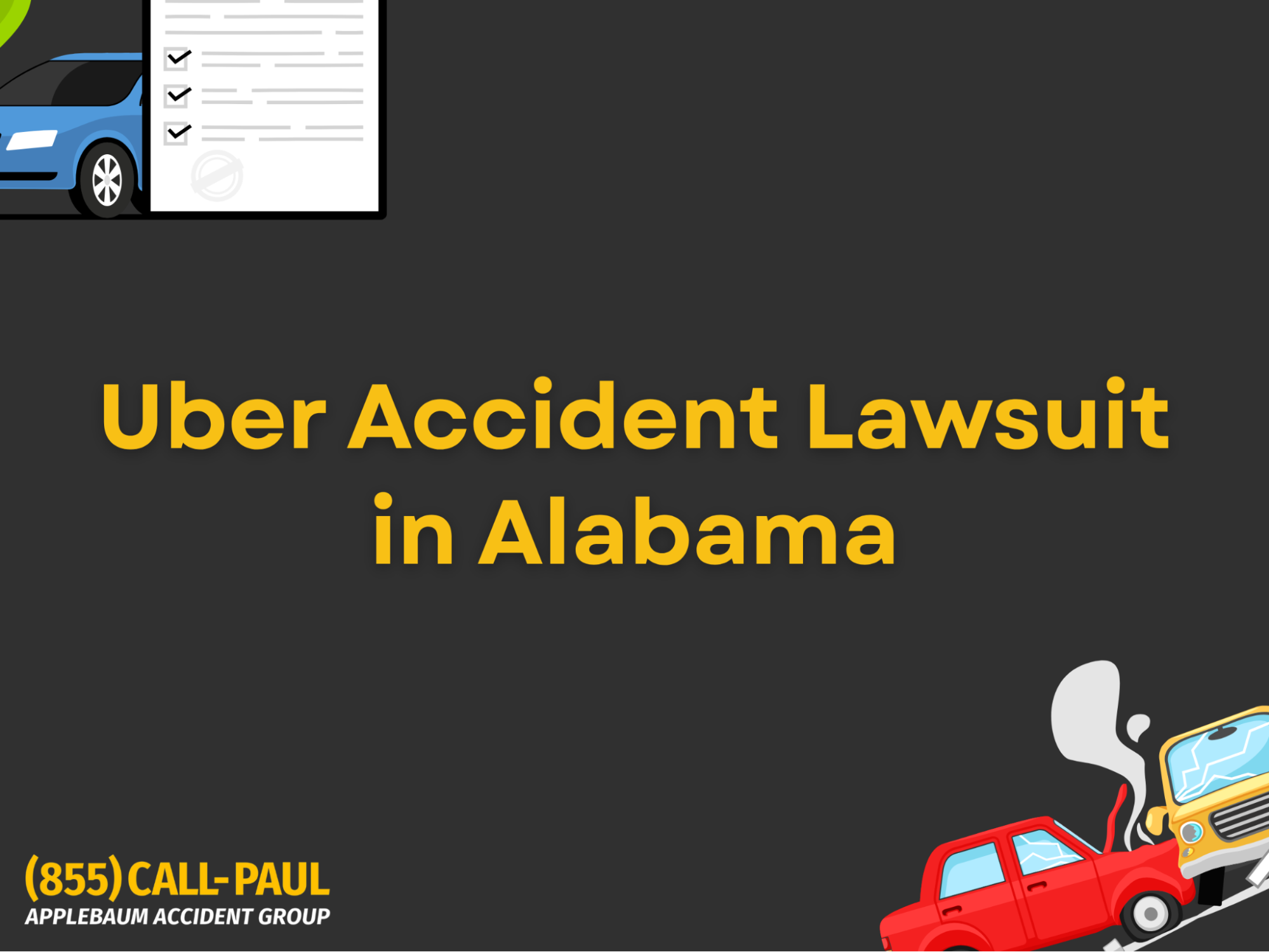Yes, you can sue after an Uber accident in Alabama, but success hinges on whether the Uber driver was at fault, logged into the app, and whether you were completely blameless. Under Alabama’s strict contributory negligence law, being even 1% responsible can cost you your entire claim.

If you’re asking whether it’s worth pursuing a case, the answer depends on three key factors:
- The Uber driver must be at fault.
- The driver must have been logged into the Uber app at the time.
- You must be completely free of blame under Alabama’s unforgiving negligence laws.
If you were straddling lanes, going slightly over the speed limit, or even braked unexpectedly, insurers could use that sliver of doubt to block your entire claim.
In some cases, you can sue Uber itself. Especially if you can prove the company had knowledge of a problematic driver, failed to enforce safety protocols, or denied coverage unfairly. But often, it starts with the driver’s insurance and escalates depending on their app status and fault.
This is where Applebaum Accident Group steps in.
We connect you with professionals who know how to work Uber accident cases in Alabama. We ensure you’re matched with legal and medical help that actually understands the system and fights back against lowball offers and legal technicalities.
Want the full breakdown of what to do next and how to avoid case-killing mistakes? Keep reading.
How Uber’s Insurance Works in Alabama
Whether Uber pays, or walks away, depends entirely on the driver’s status at the moment of the crash.
- App off: Uber is not liable. The driver’s personal insurance applies.
- App on, no ride accepted: Limited third-party liability ($50K per person / $100K per accident).
- Ride accepted or in progress: Uber provides up to $1M in third-party liability coverage.
To access these benefits, you’ll need to prove the driver’s status. That means:
- Pulling ride logs
- Verifying timestamps
- Subpoenaing app data if needed
Many injured victims miss out on Uber coverage entirely, not because they weren’t eligible, but because they didn’t know to ask for driver status logs.
If you weren’t a passenger, say, you were in another car or a pedestrian, you may still qualify under Uber’s policy, but only if the driver was actively engaged with the app. This is where most cases fall apart, when victims or attorneys fail to establish app usage.
What Makes Alabama’s Laws So Tough on Victims?
Alabama applies a strict legal doctrine known as contributory negligence. Unlike in most states where you can still recover compensation if you’re partially at fault, Alabama blocks you from receiving any compensation if you’re even 1% to blame.
That means your case could be dismissed over something as minor as a poorly timed lane change or unclear signaling, even if the Uber driver was primarily at fault.
Example Scenarios:
- You were crossing lanes when the Uber driver sped up? You might get blamed, even partially, and lose your right to sue.
- You tapped your brakes before the impact? That could be enough to void your entire claim.
- What if your crash report has mistakes? Even corrected reports may be ignored by insurers looking to minimize payouts.
Insurers can and often do act on flawed initial reports, even if they’ve been disputed or amended. Some settlements are pushed through before victims can submit corrections.
What’s worse, insurance companies know Alabama’s law works in their favor, and they exploit it. They’ll look for any detail, however small, to assign partial blame and protect their bottom line. That’s why a skilled attorney, not a generalist, is critical in Uber accident cases here.
What to Do After an Uber Accident in Alabama (Step-by-Step)
A single misstep can derail your entire claim. Follow these steps to protect your rights and preserve your eligibility for compensation:
-
- 1. Call 911 Immediately:Ensure there’s an official police report. This document becomes central to your legal strategy and insurance negotiations.
- 2. Seek Medical Treatment Right Away: Even if you feel fine, internal injuries can surface later. Delayed care gives insurers a reason to downplay your injuries, or claim they’re unrelated.
- 3. Document the Scene
-
- Take photos of vehicle damage, road conditions, and any visible injuries.
- Capture wide shots and close-ups.
- Dashcam footage is gold, and often missed. If you don’t have one, consider getting one now for future protection.
- 4. Avoid Recorded Statements: Insurers, especially Uber’s, often ask for recorded statements early. Don’t give one. These can and will be used to shift fault, especially if your words can be twisted or misinterpreted.
- 5. Record All Interactions: If you speak with insurance adjusters, record the conversations (where legally allowed). This creates a paper trail and prevents them from mischaracterizing your statements.
- 6. Contact a Legal Professional Who Understands Uber Claims: Not every attorney is equipped to handle a case like this. You need someone who knows how to subpoena ride logs, challenge app usage denials, and understand how to prove fault under Alabama’s unforgiving standards.
Can You Sue Uber After an Accident in Alabama?
Yes, but only under specific conditions. You must prove:
- The Uber driver was at fault. Liability hinges on showing that their actions directly caused the accident.
- The driver was logged into the Uber app. If they were off-duty, Uber’s insurance doesn’t apply.
- You were 0% at fault. Alabama’s contributory negligence doctrine bars recovery if you share any blame.
This is where most victims get blindsided. Even the smallest misstep, like slightly veering or tapping the brakes, can be used to pin 1% fault on you. That’s enough to sink your entire case.
How Uber’s Insurance Works in Alabama
Uber uses a tiered insurance system, and your access to compensation depends on which “phase” the driver was in:
- App off: Uber provides no coverage. The driver’s personal insurance is responsible.
- App on, no ride accepted: Uber offers limited third-party liability:
- $50,000 per person for bodily injury
- $100,000 total per accident
- Ride accepted or in progress: Uber activates its full $1 million policy for third-party injuries and damages.
The driver’s status is a key detail, and it’s not always easy to prove. You or your attorney may need to:
- Subpoena ride logs and app data
- Pull timestamped trip records
- Collect location data synced with crash time
What Makes Alabama’s Laws So Tough on Victims?
Alabama is one of the few states still enforcing pure contributory negligence. This means:
- If you’re found even 1% at fault, your case is over.
- Unlike most states where you might recover partial compensation, Alabama offers no gray area.
Real-world Examples:
- You switched lanes without signaling, and the Uber driver rear-ended you? That alone could cost you everything.
- You braked hard in traffic, even if necessary? You might be labeled partially at fault.
And here’s the kicker: insurance companies know this. They hunt for any minor misstep to push partial blame onto you, then deny the claim outright.
When Does an Uber Lawsuit Go to Court?
The vast majority of Uber accident lawsuits in Alabama settle during pre-trial mediation. Courts often encourage both sides to resolve the dispute without a trial. That’s because trials are expensive, time-consuming, and unpredictable, especially under Alabama’s fault laws.
But sometimes, trial is the only path forward, especially if:
- Uber denies the driver was on the app
- Fault is contested and no settlement agreement is reached
- The victim seeks damages beyond what Uber offers
What happens when your case goes to court?
- Discovery begins: Both sides exchange evidence, including medical records, ride logs, and statements.
- Depositions follow: Key witnesses, including the Uber driver and any bystanders, give sworn testimony.
- Trial prep and arguments: Your legal team builds a case showing the Uber driver’s negligence and your lack of fault.
- Jury decides the outcome.
How Much Can You Win in an Uber Lawsuit?
Your potential compensation depends on several factors, including:
- Medical expenses, from emergency care to long-term rehab
- Lost wages, both immediate and future earning potential
- Pain and suffering, emotional distress, reduced quality of life
- Whether you share any fault, because if you do, you could be barred from any recovery
Uber’s coverage limits in Alabama:
- Up to $1 million in third-party liability coverage if the driver had accepted a ride or was actively transporting a passenger
Common Missteps That Can Ruin Your Case
Even strong claims can unravel because of preventable mistakes. Be aware of these pitfalls:
- Speaking to Uber’s insurer too early: Adjusters are trained to find inconsistencies or admissions of fault, even casual ones.
- Delaying medical treatment: A late visit to the doctor may lead insurers to argue your injuries aren’t serious or accident-related.
- Accepting crash report errors: Inaccurate police reports, left uncorrected, can be used to assign fault unfairly.
- Skipping legal help early on: Waiting until the last minute to get representation puts you at a disadvantage.
Victims often underestimate the harm caused by bureaucratic delays. A 15-day wait for crash reports, missing hospital records, or gaps in medical visits can erode trust and undercut your credibility.
How to Strengthen Your Case Before Filing
Preparation makes or breaks an Uber accident lawsuit in Alabama. Here’s how to build leverage before you ever step foot in court:
- Secure ride logs and app data: Proving the Uber driver was logged in or en route is central to accessing that $1M coverage.
- Maintain consistent medical documentation: Regular follow-ups show a clear treatment timeline and link your injuries directly to the crash.
- Track every expense: From prescriptions to rideshares to physical therapy, log all accident-related costs.
- Use a trusted referral service: Navigating Alabama’s contributory negligence laws isn’t a job for just any law firm.
Still Unsure? Get Help Understanding Your Rights
Let’s recap what you’ve learned:
- Yes, you can sue after an Uber accident in Alabama, but only if you’re entirely blameless.
- Uber’s insurance coverage varies based on driver status. You’ll need proof that the driver was using the app at the time of the crash.
- Alabama law sets the bar high. Even a minor share of fault could eliminate your chances of recovering compensation.
Get Matched with the Right Legal and Medical Team, Before It’s Too Late

If you’re facing the aftermath of an Uber crash in Alabama, you’re up against a giant corporation, and also up against one of the most unforgiving legal systems in the country.
Applebaum Accident Group was built for situations just like yours. Here’s how we help:
- We connect you with attorneys who know how to beat the 1% rule. These legal professionals understand Uber’s layered insurance policies, can subpoena ride logs, and fight to keep fault off your record.
- We help you find medical providers who document properly. A poorly written medical record can destroy your injury claim. Our network ensures you’re supported by experts who speak the language of injury law.
- We advocate for you, start to finish. You’re not just a case file. You’re a person who deserves real support, clear answers, and results.
Take the guesswork out of your claim.
👉Contact Applebaum Accident Group and we’ll connect you with the legal and medical resources you need to build a strong, winning case, before deadlines close and evidence disappears.





